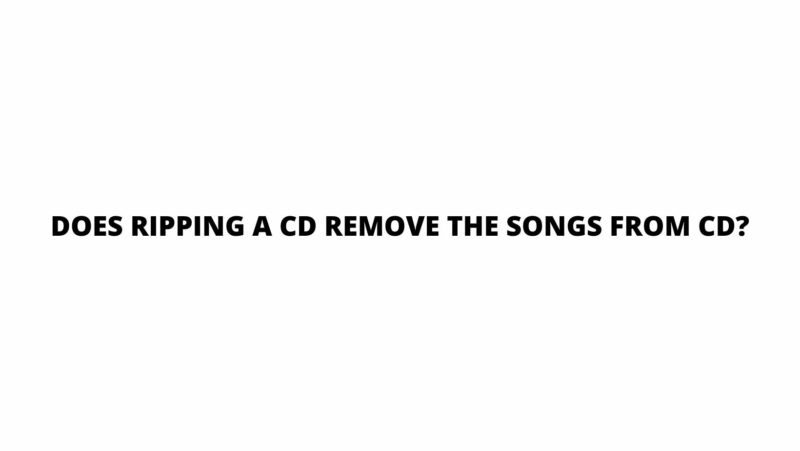In the ever-evolving landscape of music consumption, the process of ripping audio CDs has gained prominence as a means to digitize music collections and make them easily accessible across various devices. However, a common question that arises is whether ripping a CD results in the removal of the songs from the physical disc. In this article, we’ll delve into the intricacies of CD ripping, understanding how it works, and clarifying the misconception surrounding the removal of songs from the original disc.
**1. Understanding CD Ripping: CD ripping is the process of extracting audio tracks from a compact disc and converting them into digital formats such as MP3, FLAC, or WAV. This conversion allows users to store the music on computers, smartphones, or media players and enjoy it without relying on the physical CD. Ripping software reads the data stored in the disc’s pits and lands, converting it into a digital representation that mirrors the original audio content.
**2. Creating Digital Copies: When you rip a CD, you essentially create a digital copy of the audio content. This copy is stored as a file on your device’s storage media. The process does not involve altering or removing the data from the original CD itself. Each track on the CD is transformed into a separate digital audio file that can be played independently. This means that while you’re creating digital versions of your music, the physical CD remains intact and untouched.
**3. Non-Destructive Process: It’s important to understand that CD ripping is a non-destructive process. The data on the CD is read without altering its structure. Ripping software reads the data using the CD drive’s laser and converts it into a digital format, while leaving the original CD’s data undisturbed. This is akin to making a photocopy of a document without erasing the original text.
**4. Metadata and Track Information: When you rip a CD, the ripping software often retrieves track information and metadata from online databases. This metadata includes details such as song titles, artist names, album names, and more. This information is embedded in the digital audio files you create during the ripping process. However, this process also does not modify the original CD in any way.
**5. Legal and Ethical Considerations: It’s worth noting that while ripping a CD for personal use is generally considered legal and ethical in many jurisdictions, distributing or sharing ripped copies of copyrighted music without proper authorization is often prohibited. Creating a digital backup of music you legally own is usually well within your rights, but it’s important to adhere to copyright laws and regulations.
**6. Preserving Audio Quality: One of the advantages of CD ripping is the ability to choose the audio format and quality of the digital copies you create. Different formats offer varying levels of audio quality and file size. Lossless formats like FLAC preserve the original audio quality without any loss of information, while compressed formats like MP3 prioritize smaller file sizes. This customization ensures that you can enjoy your music in the quality that suits your preferences.
**7. Benefits of CD Ripping: CD ripping offers several benefits beyond just creating digital copies of your music. It allows you to declutter your living space by reducing physical media, makes your music collection easily portable across devices, and provides the convenience of creating playlists and shuffling tracks without handling physical CDs.
Conclusion: In conclusion, ripping a CD does not remove the songs from the original disc. Instead, it creates digital copies of the audio content that can be stored, organized, and played on various devices. The process is non-destructive, leaving the original CD untouched and intact. CD ripping is a valuable tool for modern music enthusiasts, providing flexibility, convenience, and control over how we access and enjoy our favorite tunes while preserving the integrity of our cherished physical collections.


